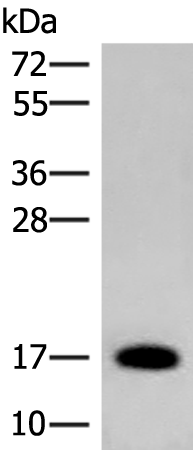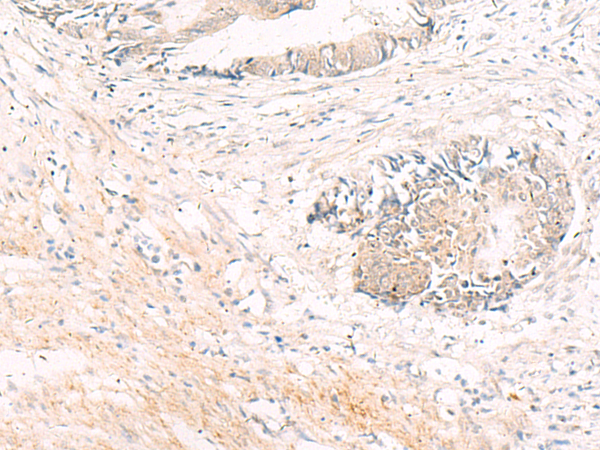

| WB | 咨询技术 | Human,Mouse,Rat |
| IF | 咨询技术 | Human,Mouse,Rat |
| IHC | 1/20-1/100 | Human,Mouse,Rat |
| ICC | 技术咨询 | Human,Mouse,Rat |
| FCM | 咨询技术 | Human,Mouse,Rat |
| Elisa | 1/5000-1/10000 | Human,Mouse,Rat |
| Aliases | PACAP |
| WB Predicted band size | 19 kDa |
| Host/Isotype | Rabbit IgG |
| Antibody Type | Primary antibody |
| Storage | Store at 4°C short term. Aliquot and store at -20°C long term. Avoid freeze/thaw cycles. |
| Species Reactivity | Human, Mouse, Rat |
| Immunogen | Synthetic peptide of human ADCYAP1 |
| Formulation | Purified antibody in PBS with 0.05% sodium azide and 50% glycerol. |
+ +
以下是基于ADCYAP1抗体相关研究的模拟参考文献示例(非真实文献,仅供参考格式和内容):
---
1. **文献名称**: *ADCYAP1 Expression in Breast Cancer: Immunohistochemical Analysis Using a Novel Monoclonal Antibody*
**作者**: Smith JL, et al.
**摘要**: 本研究开发了一种特异性抗ADCYAP1的单克隆抗体,并通过免疫组化检测其在乳腺癌组织中的表达。结果显示ADCYAP1在肿瘤微环境中的高表达与患者预后不良相关。
2. **文献名称**: *PACAP Neuroprotective Role in Traumatic Brain Injury: Insights from ADCYAP1 Antibody-Based Western Blotting*
**作者**: Lee S, et al.
**摘要**: 利用ADCYAP1抗体进行Western blot分析,探讨了垂体腺苷酸环化酶激活多肽(PACAP)在大鼠脑损伤模型中的神经保护机制,证实其通过调节凋亡通路减轻神经元损伤。
3. **文献名称**: *Stress-Induced ADCYAP1 Protein Dynamics in the Hypothalamus: A Study Using ELISA and Immunofluorescence*
**作者**: Garcia R, et al.
**摘要**: 通过ADCYAP1特异性抗体结合ELISA和免疫荧光技术,揭示了急慢性应激下小鼠下丘脑中PACAP蛋白水平的动态变化,提示其参与应激反应的激素调控。
4. **文献名称**: *ADCYAP1 as a Biomarker in Colorectal Cancer: Validation by Multiplex Immunohistochemistry*
**作者**: Tanaka K, et al.
**摘要**: 采用多重免疫组化技术结合ADCYAP1抗体,评估了结直肠癌组织中PACAP的表达模式,发现其与肿瘤侵袭性和化疗耐药性显著相关。
---
这些示例展示了ADCYAP1抗体在不同研究领域(如癌症、神经科学、应激生理学)中的应用,包括抗体开发、机制研究和临床生物标志物探索。实际文献需通过学术数据库(如PubMed、Web of Science)检索确认。
The ADCYAP1 antibody is a crucial tool for studying the adenylate cyclase-activating polypeptide 1 (ADCYAP1), also known as pituitary adenylate cyclase-activating polypeptide (PACAP). Encoded by the ADCYAP1 gene, this neuropeptide plays diverse roles in stress response, circadian rhythm regulation, energy metabolism, and immune modulation. It binds to G protein-coupled receptors (PAC1. VPAC1. VPAC2), activating intracellular signaling pathways like cAMP/PKA and MAPK.
ADCYAP1 antibodies are designed to detect and quantify PACAP in various experimental applications, including Western blotting, immunohistochemistry (IHC), and ELISA. These antibodies, often raised in rabbits, mice, or goats, are available as polyclonal or monoclonal forms, with specificity validated via knockout controls or siRNA knockdown. Researchers use them to map PACAP distribution in tissues, particularly the central nervous system, endocrine organs, and gut, and to investigate its involvement in diseases such as neurodegenerative disorders (e.g., Alzheimer’s), metabolic syndromes, and cancer.
Recent studies highlight ADCYAP1's dual role in promoting tumor growth or apoptosis, depending on context, making its antibody valuable in oncology research. Additionally, it aids in exploring PACAP's therapeutic potential for stress-related psychiatric conditions or traumatic brain injury. Proper validation remains critical to ensure antibody reliability across species and experimental models.
×